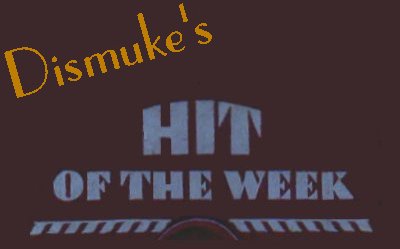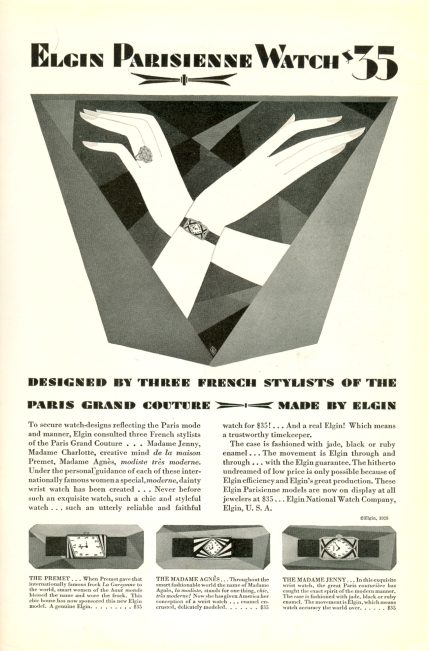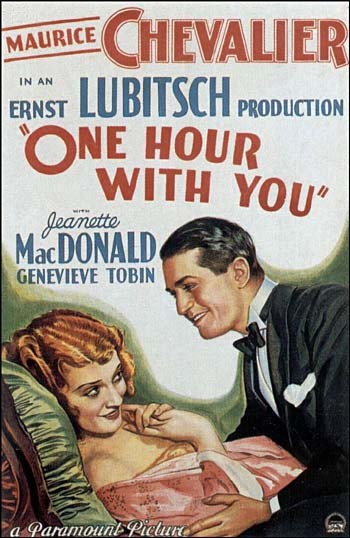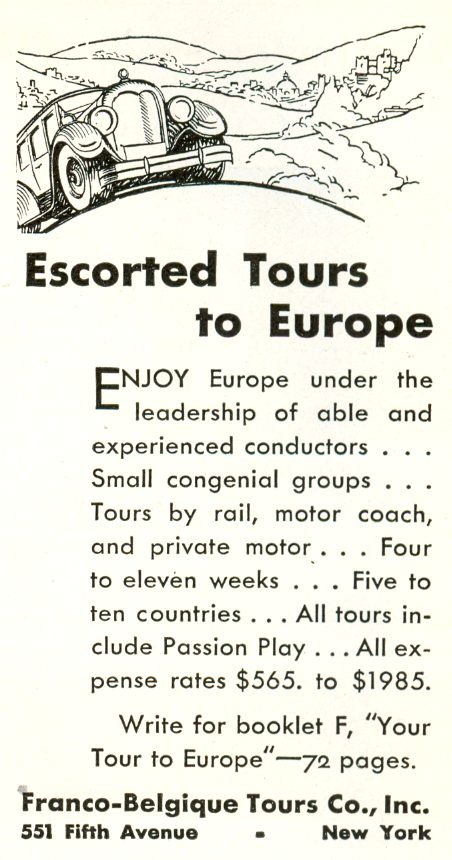

May 2008
May 15
This week's Hit of the Week is brought
to you by

(Click On Image For Larger View)
ELGIN PARISIENNE
WATCH
$35
(from 1928 ad)
Donít
Hold Everything
The High Hatters
1928
(Victor 21791-A)
To
Know You Is To Love You
The High Hatters
1928
(Victor 21791-B)
Plucky
Lindyís Lucky Day
The High Hatters
1929
(Victor 21909-A)
Good
Little Bad Little You
The High Hatters
1929
(Victor 21909-B)
Regular guest contributor
Matt From College Station will be taking a hiatus from writing any
updates for a few months as he busy doing the final work necessary to get
his degree. In the meanwhile, he will be still contributing
by making recordings from his collection available - it will just
be me telling you about them rather than him. And, as always,
I am responsible for the transfer and audio restoration work.
This week's selections come from Matt's collection.
The High Hatters were an in-house
band of the Victor Talking Machine Company led by Leonard Joy, one of Victor's
music directors. Most of the band's recordings were exceptionally
upbeat and peppy even by the high standards of the era.
"Don't Hold Everything" and "To
Know You Is To Love You" are DeSylva, Brown & Henderson
compositions from the Broadway production Hold Everything which
ran for over 400 performances between October 1928 and October 1929.
A film adaptation of the production was released in 1930.
"Plucky Lindy's Lucky Day" is a
topical novelty song commemorating Charles Lindbergh's engagement to
Anne Morrow, the daughter of the U.S. Ambassador to Mexico. Lindbergh
met Morrow in Mexico in December 1927 eight months after his solo
trans-Atlantic flight made him an overnight celebrity. The recording
session for the song took place in March 1929, a couple of months prior
to the wedding.
This version of "Good Little Bad
Little You" is performed at a somewhat slower tempo than one usually hears
for both the song and for the High Hatters. The song
was composed by Bud Green and Sam H. Stept.
- Dismuke
If you have questions or
comments about the music or would simply enjoy interacting with friendly
people who share your interest in it, join in the conversation on Dismuke's
Message Board.
EXTRA
This section will present
78 rpm recordings that do not fall within the range of the vintage pop
and jazz fare that I usually present. Here I will feature
recordings from a wide variety of eras, musical genres and nationalities
as well as occasional spoken word recordings.

One
Hour With You
Jeannette MacDonald
1932
(Victor 24013-A)
We
Will Always Be Sweethearts
Jeannette MacDonald
1932
(Victor 24013-B)
Here are two additional recordings
from the collection of Matt From College Station. These are two songs
from the 1932 Paramount film One Hour With You which starred Jeanette
MacDonald and Maurice Chevalier and was directed by Ernst Lubitsch.
Matt introduced me to the film a couple of years ago and I rank it among
my favorites. It is a film I highly recommend - and unlike a lot
of movie musicals and comedies from the early "talkies" era, it has
held up over time very well.
While the musical score for the
film was provided by the famous Viennese operetta composer Oscar Straus,
the title song was composed by Richard A. Whiting and Leo Robin.
I very much enjoy MacDonald's rendition of it in this recording.
However, in the film the song was performed by Donald Novis backed up by
Jimmie Grier's Cocoanut Grove Orchestra. A commercial
78 rpm version of the song performed by Novis and the Jimmie Grier Orchestra
was issued on Victor 22971 and was years later featured in the 1973 film
Paper
Moon. Matt has a copy of that record - I will have to see
if he can make it available for a future update.
"We Will Always Be Sweethearts"
is one of the Oscar Straus songs from the film - and like most Oscar Straus
compositions, is very pretty.
Happily, One Hour With You,
along with three other Ernst Lubitsch movie musicals from the early 1930s
have recently been reissued
in a DVD box set by the Criterion Collection. One of the films
is The Smiling Lieutennant which is a 1931 adaptation of Oscar Straus'
famous 1908 operetta A Waltz Dream (Ein Walzertraum) - which
just so happens to be my favorite operetta. The Smiling Lieutennant
features Maurice Chevalier but not Jeanette MacDonald. MacDonald
does appear in the other films in the collection, Love Parade from
1929 and Monte Carlo from 1930.
- Dismuke
If you have questions or
comments about the music or would simply enjoy interacting with friendly
people who share your interest in it, join in the conversation on Dismuke's
Message Board.
Next Thursday: Chester
Leighton And His Sophomores
May 8
This week's Hit of the Week is brought
to you by

Franco-Belgique Tours Co., Inc.
(from 1930 ad)
Iím
Still At Your Beck And Call
The Rhythm Maniacs
1930
(UK Decca F 2015 mx MB 1785)
Heís
My Secret Passion
The Rhythm Maniacs
1930
(UK Decca F 2015 mx MB 1786)
Maurice
Chevalier Selection Part 1
The Rhythm Maniacs
1930
(UK Decca F 2131 mx GB 2370)
Maurice
Chevalier Selections Part 2
The Rhythm Maniacs
1930
(UK Decca F 2131 mx GB 2371)
Regular guest contributor
Matt From College Station will be taking a hiatus from writing any
updates for a few months as he busy doing the final work necessary to get
his degree. In the meanwhile, he will be still contributing
by making recordings from his collection available - it will just
be me telling you about them rather than him.
The Rhythm Maniacs were a British
band that I was not familiar with until I heard these recordings from Matt's
collection. The band was a in-house group for Decca
Records (a different company from the American record label named Decca
which was founded in 1934) led by the company's recording manager Philip
Lewis.
When I first listened to the Matt's
record of the first two selections, I was very impressed by the band's
style - it is reminiscent of some of the less-known regional or "territory"
dance bands in the USA. I am not sure who the vocalist on the
recordings is.
The Maurice Chevalier selections
feature songs Chevalier popularized in his 1929 and 1930 movies.
The band sounds great - but, unfortunately, the vocalist does NOT do an
especially good job at imitating Chevalier's accent.
UPDATE: A visitor was kind
enough to write in with the suggestion that the vocalist on "I'm Still
At Your Beck And Call" and "He's My Secret Passion" is Ella Logan.
- Dismuke
If you have questions or
comments about the music or would simply enjoy interacting with friendly
people who share your interest in it, join in the conversation on Dismuke's
Message Board.
EXTRA
This section will present
78 rpm recordings that do not fall within the range of the vintage pop
and jazz fare that I usually present. Here I will feature
recordings from a wide variety of eras, musical genres and nationalities
as well as occasional spoken word recordings.
Wunderschöne
Frau wir beide kennen uns doch
Paul Godwin Tanz Orch
circa 1930
(Polydor C4002 order 23271 mx 2399)
Komst
du mich einmal verzeihín
Paul Godwin Tanz Orch
circa 1930
(Polydor C4002 order 23271 mx 2398)
Here are two additional recordings
from the collection of Matt From College Station.
I am very fond of German popular
recordings from the 1920s - and I think both of these recordings are very
beautiful and haunting.
Paul Godwin was one of a number
of highly successful Jewish musicians and entertainers who were forced
to flee Germany when the National Socialist came to power in 1932.
Godwin, whose real name was Pinchas
Goldfein, was a violinist and bandleader who achieved enormous popularity
in Germany during the 1920s and 1930s. Godwin recorded a wide variety
of music ranging from popular fox trot dance band selection to the
classics. By 1928 he had made over 1,500 records. It
is estimated that between 1923 and 1933 his records sold upwards of 9 million
copies. He and his band were also in heavy demand for live performances.
Godwin fled to Holland in 1933 where
he continued to perform. He also performed on tour in other European
countries during the balance of the 1930s. When the Germany
invaded Holland in World War II, all Jews were forced into a Jewish Ghetto
in Amsterdam. Godwin found work performing with other Jewish entertainers
in a theatre in the ghetto. In 1942, however, that theatre was used
as a collection point where tens of thousands of Dutch Jews were rounded
up for deportation to the Westerbrook concentration camp from which they
were subsequently transported to Auschwitz and murdered. Because
Godwin's wife was considered an "Aryan" he was able to go underground and
avoided the concentration camps.
After World War II, Godwin chose
to remain in Holland. He became a Dutch citizen in 1952.
He continued to perform but focused mainly on classical music.
- Dismuke
If you have questions or
comments about the music or would simply enjoy interacting with friendly
people who share your interest in it, join in the conversation on Dismuke's
Message Board.

|


